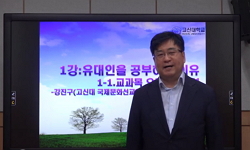In this age of globalization, the meaning and power of the national, ethnic and cultural boundaries are getting blurred and trans-movements are becoming more popular. The new movements are evaluated positively from the perspective of freedom and emanc...
http://chineseinput.net/에서 pinyin(병음)방식으로 중국어를 변환할 수 있습니다.
변환된 중국어를 복사하여 사용하시면 됩니다.
- 中文 을 입력하시려면 zhongwen을 입력하시고 space를누르시면됩니다.
- 北京 을 입력하시려면 beijing을 입력하시고 space를 누르시면 됩니다.
초국적 이방인의 보호받지 못한 삶과 죽음 : 나치 수용소 유대인 생존자들의 글을 중심으로 = The Life and Death of Jews as Transnational Strangers : Comparative Textual Analyses of Nazi Concentration Camp Survivors
한글로보기부가정보
다국어 초록 (Multilingual Abstract)
In this age of globalization, the meaning and power of the national, ethnic and cultural boundaries are getting blurred and trans-movements are becoming more popular. The new movements are evaluated positively from the perspective of freedom and emancipation. This paper, however, points to another aspect of these movements: the discontent and anxiety of a transmovement drawing upon the darkest historical examples, written by survivors of Nazi concentration camps. The history of European Jews can be regarded as a history of inclusion and exclusion. The national state in the spirit of humanism and enlightenment provided citizenship to Jews, who had previously lived either as wandering Jews or as ghetto dwellers, in both cases just as excluded strangers. After 150 years of assimilation and inclusion, to be considered transnational Jews, with the emphasis particularly upon “Jews,” the label applied by the Nazis, sounded for the Jews somewhat odd, even exclusionary, as was in fact intended. The actual exclusion process enforced by the Nazis had to be executed not only emotionally but also systematically and legally. The texts of survivors of Nazi concentration camps report on how the Jews reacted to this process of exclusion from human boundaries at that time and how they lived an unprotected life as homo sacer in the concentration camps. The texts show ex negatio, how risky transnational movements could be without a corresponding respect for human rights. We see that this lesson is still valid when we look at the new shadow zones of globalization, such as refugee villages. The dangers confronting transnational movements are analyzed in the following texts: La Nuit (Elie Wiesel) and Se questo è un uomo (Primo Levy), both in translation; and Jenseits von Schuld und Sühne (Jean Améry), Der siebente Brunnen (Fred Wander), and weiter leben (Ruth Klüger), all three in the original German.
목차 (Table of Contents)
- 1. ‘초’국가의 자유, ‘초’국가의 불안
- 2. 초국적? 무국적? 유대인
- 3. 수용소 생환자들의 수기와 연구사
- 4. 수용소 생존자들의 글쓰기 작업과 그 의미
- 5. 수용소의 삶과 ‘비인간의 조건’
- 1. ‘초’국가의 자유, ‘초’국가의 불안
- 2. 초국적? 무국적? 유대인
- 3. 수용소 생환자들의 수기와 연구사
- 4. 수용소 생존자들의 글쓰기 작업과 그 의미
- 5. 수용소의 삶과 ‘비인간의 조건’
- 1) 유대인으로서의 정체성?
- 2) 개인 정체성의 상실: ‘비인간의 조건’
- 3) 개인의 말살과 저항
- 6. 수용소 이후에 계속 살아가기
- 7. 탈경계의 위험
- 참고문헌
- Works Cited
- ABSTRACT
동일학술지(권/호) 다른 논문
-
독일 시민사회의 발전 맥락에서 본 독일 양대 정당제도의 역사적 배경
- 이화여자대학교 이화인문과학원
- 안삼환
- 2013
-
브레히트의 희곡 『도시의 정글 속에서』에 나타난 혼종적 정체성
- 이화여자대학교 이화인문과학원
- 곽정연
- 2013
-
- 이화여자대학교 이화인문과학원
- 문숙자
- 2013
-
일제말기 일본어문학의 재정립과 임순득의 (재)발견, 그리고 또 다시보기
- 이화여자대학교 이화인문과학원
- 함충범
- 2013




 RISS
RISS





